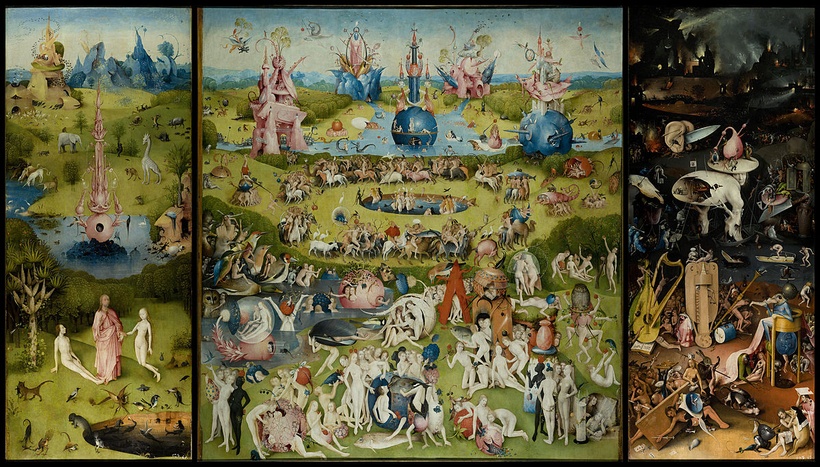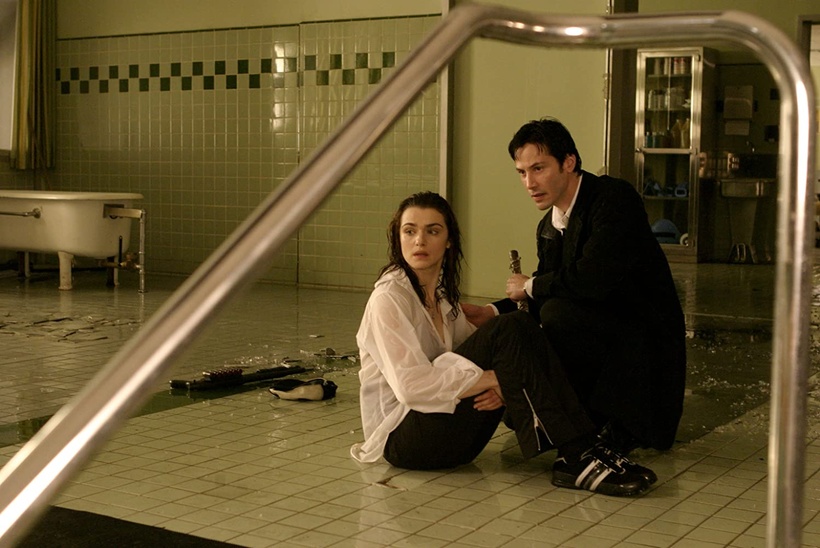
by Walter Chaw
Constantine (2005)
U.S.: rental only
Canada: Netflix, Crave
Ace music-video director Francis Lawrence made his feature-length debut with 2005’s Constantine, an adaptation of the DC Vertigo comic-book series “Hellblazer”. At the time, I resented it both for making the hero a Yank (he’s British in the books) and for not casting Denis Leary as said foul-mouthed, chain-smoking Yank. Time has been kind to the film, however, at least in my mind, as I’ve gotten over the fanboy possessiveness for “Hellblazer” to well and truly embrace the visual majesty of the piece and the absolute “Keanu-ness” of Keanu Reeves’s performance. This is post-Point Break and Neo but pre-John Wick. My son is a John Wick nut, so he was instantly engaged and able, even, to point out moments echoed in the Wick movies. A shotgun scene in Constantine stands now as a portent of the Keanu to come.
Lawrence’s history as a music-video director is worth a few comments at the beginning and end of the screening. If you want and are YouTube-capable, stream one of his videos. As an appetizer we watched Britney Spears’s sorta racy “I’m a Slave 4U,” which was made around the same time and even uses a few of the same shots. Plus: Britney.
- Early filmmakers largely had backgrounds in other forms of entertainment: musical theatre, stage, vaudeville–how does Lawrence’s background inform Constantine’s aesthetic?
- How does it influence the editing of the piece?
- How does Lawrence handle the soundtrack for the picture?
The film follows the adventures of a hardboiled noir detective, John Constantine, as he’s pulled into an infernal plot by the prince of Hell to birth himself into the mortal realm. A lot of time is given over to the theology of Lucifer’s fall and the “deal” between God and the Devil to wage an ideological war using humanity as their battleground.
- Compare the uses of religion in Constantine with The Night of the Hunter.
- What is “good” faith vs. “bad”?
Constantine has survived a suicide attempt that has damned his soul despite all his efforts to win salvation. The idea of eternal damnation for this act is explored in Dante’s Inferno and we found this to be a good time to introduce “the Divine Comedy” to the kids (our daughter had heard of it but not read it; our son was less familiar): how it’s a trilogy, essentially, with the sexiest one set in Hell. This led to some discussion of how the architecture of Hell has been something built outside of the Bible through other writing and representations.

I showed them Bosch’s “Garden of Earthly Delights” and asked if there were images in the film that reminded them of it.

I also showed them Caravaggio’s “The Incredulity of Saint Thomas,” since Constantine features the “Spear of Destiny”–the one used to kill Christ on the cross. This is good stuff not just for this film, but for when we watch Peter Weir’s Fearless, where that film’s hero feels as though he’s been resurrected–and early on examines a mysterious wound in his side.
- Is Constantine a “religious” film?
- How is water used in Constantine?
- How is water used in religious rituals?

Constantine’s “fatale” is Angela (Rachel Weisz), a cop–and a Catholic–who recently lost a twin sister to suicide. She’s drawn to Constantine and enlists him to help her prove her sister was murdered so that she can bury her in consecrated ground.
How are Church officials portrayed in this film?
Tilda Swinton’s archangel Gabriel is a predictably striking highlight of the film. I like that we’re watching this movie now because it sets the stage for a future screening of Sally Potter’s Orlando. We talked about how angels in literature are sexless, perhaps androgynous. This adherence to the letter of source materials rather than to popular representation in western canon opens the door for a viewing of Aronofsky’s Noah, too.
Gabriel here is a “half-breed” who would like to see the world burn–she’s evil, albeit a different sort of evil from Lucifer, who’s portrayed, in a showstopper of a performance, by Peter Stormare, whose appearance paves the way for Fargo at some point.
- How is Constantine connected to The Night of the Hunter?
- How is Constantine connected to Out of the Past?
Constantine is basically a noir film with a fallen hero (who is ironically the only light in a fallen world), seduced by a dangerous woman into taking a case, during the investigation of which he discovers that he’s ultimately fucked. It’s also a film about religious hypocrisy, and grace, that trafficks in broader philosophies governing the essential natures of damnation and salvation. Constantine pokes at huge, intimidating bears. What you say to your kids after a screening–and what they say back–could prove quite illuminating.
We’ve raised our kids to be respectful but curious. Ravenously curious. Curiosity is what will save us. In this house, curiosity is our religion. Everything is potentially permissible, though you have to have a conversation with your parents about it beforehand and afterwards. They have been encouraged to read the King James Bible as well as other major world mythologies, and to draw lines between them. Whatever they end up believing, they will have gotten there by knowing and not just by aping what their parents believe.
As to what we believe: we are atheists–though, I like to think, not hostile ones. Films like this (and Bresson’s, and Paul Schrader’s) make me very curious indeed. The Exorcist‘s Father Karras tickles something in me, and I like to use words like “blessed” and “grace” because I feel both in my life, although I resist ascription to the supernatural. I’m a pretty skeptical guy. Having said that, I’ve had a couple of first-hand encounters with ghosts that I have a hard time explaining.
- There’s a line in Constantine where someone is told that the Devil “believes in them.” What are your thoughts about faith and belief?
- How does this film address those beliefs or challenge/bolster that faith?
God is described as passive in Constantine, a depiction John Milton assumes in his Paradise Lost and seems almost critical of when he muses that all that suffering in the war between Heaven and Hell could be abated instantly if only God would intervene.
- How does God intervene in Constantine?
- Does he “win”?
- What are the terms of victory in Constantine?
Finally, again:
What is this movie about?
Force them to answer in the global, galaxy-brain sense.
- How does Constantine fit into the world of 2005? Who was President then?
- How is 2005 similar to 1947 (the year of Out of the Past)? To 1955 (The Night of the Hunter)?
- Why are we asking the same questions through time?
- What social/collective anxieties are these films attempting to address?
Next up: John Patrick Shanley’s wonderful Joe Versus the Volcano.




